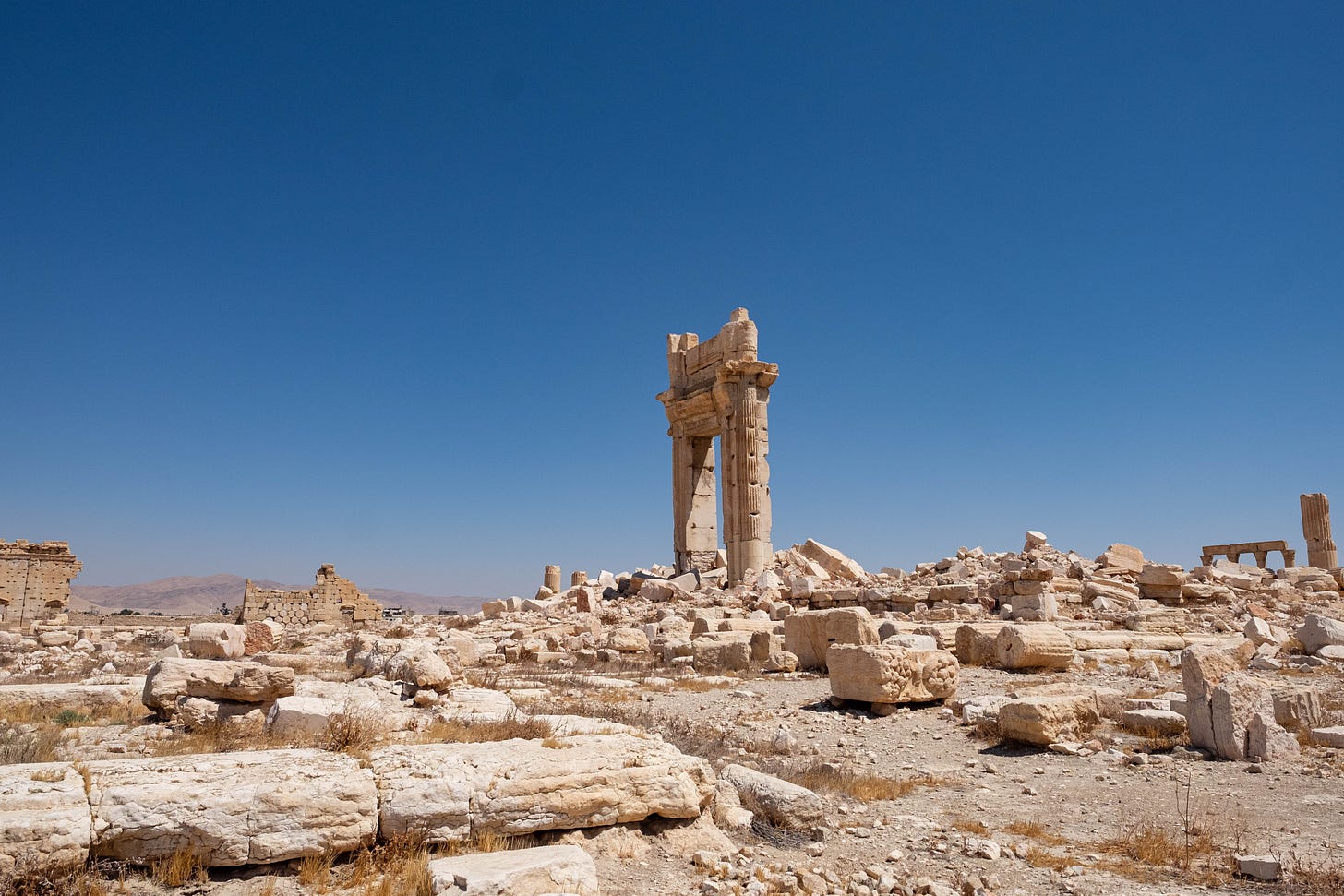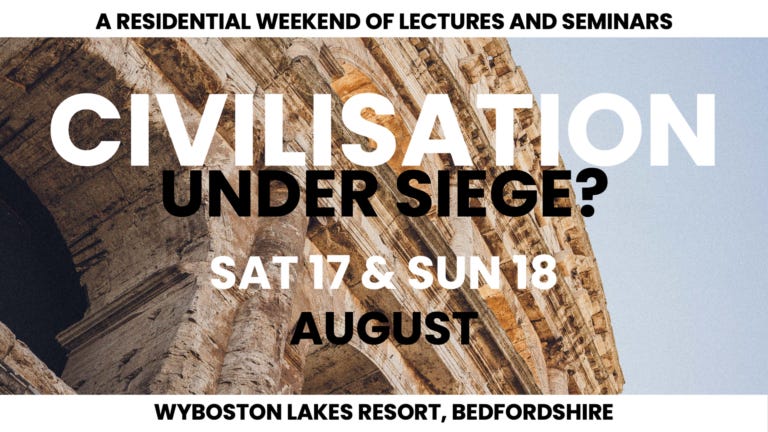Jacob Reynold’s post concerns an important event where the controversy surrounding Civilization will be discussed. I will speaking and attending this exciting event.
Jacob Reynolds introduces the theme for The Academy 2024: Civilisation Under Siege? Get your tickets now.
Jacob Reynolds is the convenor of this year’s The Academy organised by Ideas Matter - entitled Civilisation Under Siege? In this guest Substack, Jacob reflects on one of the key texts for the weekend, Sigmund Freud’s Civilization and Its Discontents, looking at how the challenges to our sense of civilisation have changed in the twenty-first century.
Get your tickets for The Academy now with our EARLYBIRD DISCOUNT until 10 June.
‘Our civilisation is at stake, our way of living’ - Emmanuel Macron
‘We are approaching a civilisational moment’ - Matthew Goodwin
‘Civilisation is at stake’ - Elon Musk
Sigmund Freud, in his seminal work posed between the two World Wars, suggested that the process of civilisation produced an inevitable ‘discontent’ in individuals. In order to fit into society, we have to repress certain basic impulses. Rather than simply taking what we want and what we can from the dinner table, we had to learn manners. Rather than simply satisfying the sexual urge, we had to learn courtship. And so on. His model implies an idea of man almost bursting at the seams, constantly living with desires lurking in the background of our unconscious, ready to explode.
Published in 1930, Civilization and Its Discontents has seemed, in retrospect, prophetic. Isn’t it true that, only a few years later, Europe descended into barbarism with all the repressed urges of civilisation bursting out in monstrous fashion? Freud’s model has provided something of an unofficial template for elites in Western society – they see their role very much in terms of managing and constraining the dangerous impulses of ordinary people. For the post-War elites, ‘never again’ meant never trust the masses.
The point is not that the fear the elites had of the masses’ irrational outbursts was a justified one, but that a terrified elite couldn’t even dream of a coherent, ‘rational’ threat to their civilisation. The virtues of their civilising processes were such an unquestioned, bedrock assumption of society at large that even the most profound threats to their way of life could not challenge them. Only those literally out of their minds would reject civilisation – no-one would knowingly reject it.
Freud’s view of the boiling inner workings of man might have inspired a trend of political thought which has poured doubt on rationality, agency and even democracy, but his work did hit on a fundamental truth about the human condition: civilisation is a human accomplishment, one that cannot be guaranteed. Discontent, in Freud, was akin to the philosophical and psychological anxiety described by existentialist writers: it represented not a state of evil in man, but a vague feeling of being ill-at-ease with the necessary but still constraining social order.
The society of Freud’s time could barely entertain the idea that an individual might openly take a stand against civilisation. Instead, the threat to civilisation lay in the chance outburst of irrational impulses. The masses might be regrettably prone to such impulses, but they represented an irrational, not rational, challenge to civilisation.
The only germ of an alternative challenge to the civilisational idea was the romantic impulse stretching back at least to the philosopher Jean-Jacques Rousseau. Society’s artifice hampered the ‘true’ or ‘natural’ inclinations of mankind. But even the Rousseauian critique - which was, in any case, understandable given the grotesque pretensions that sustained the high society against which he rebelled - was still comprehensible within the confines of Western civilisation. Rousseau, and the romantic tradition more broadly, sought to liberate man - to unleash his creative impulses - on the assumption that only then could a true civilisation equal to the splendour of the Greeks emerge.
But it was Freud’s model which structured the thinking of much of the post-War elites. His utility lay in both articulating the theory of the unconscious - which allowed psychiatrists to become the doctors of the soul - and in generalising this medical approach to society - which allowed the technocratic class to claim the same authority for society at large.
Still, however questionable this influence was, it implied that man only erred from the good out of irrationality. It was only the irrational outburst that overcame man’s tendency towards the good. Even when it came to explaining the Nazis, the monstrous ‘rationality’ of the death machine, the Freudian model rejected the idea that evil was at play and instead insisted the problem was the ‘authoritarian personality’. In other words, Nazis were simply irrational victims of their upbringing. The idea that there was something truly barbaric in Nazism was given a wide berth.
Contemporary threats to civilisation
Today, the situation seems rather different. For one thing, the technocrats of our time do not promise a better society. At best, they suggest that by constraining our appetites we might ward off environmental disaster – in other words, they promise only to avert us from the worst.
But the more important difference between our time and that of Freud’s is that we are forced to confront a threat to civilisation more profound than the mere outbursts of the irrational. Today, the idea of civilisation faces a more open, articulated series of threats.
This is sometimes difficult to spot because the threats assume such a barbarous form that we are tempted to dismiss them in the same terms as the Freud-inspired elites. The destruction of Palmyra by sledgehammer, the torture of civilians at Bucha, the rape and butchery at Nova all seem so gratuitously evil that we are tempted to dismiss them as the workings of the irrational. At best, we invoke the spectre of nihilism – but all this suggests is that we find these acts essentially incomprehensible.
The barbarism of the present moment is anything but irrational. It is the product of a definite ideology – perhaps not fully formed or fully coherent (think queers for Palestine) but nonetheless ‘rational’ in the narrow sense of containing premises and arguments.
At the level of theory, its underpinnings and articulations can be found in the deconstruction of what is called ‘Western civilisation’. Entire academic divisions are given over to ‘debunking’ the idea that there is any real distinction between civilised and barbarian (and indeed, they argue we have something to learn from the latter). Instead, what we call ‘the West’ is merely the product of osmosis from the non-Western Other. Further cottage industries are devoted to ‘queering’ or ‘challenging’ the binaries which provide civilisation with its essential boundaries: human and animal, adult and child, man and woman. The work of the sledgehammer is morally equal to the work of the sculptor.
The oppressed and the oppressor
At the level of politics, this anti-Western-civilisation logic is structured by the sanctification of ‘the oppressed’. The successful claim of oppression becomes both the source of authority and a kind of virtue - we must listen to the oppressed and celebrate their actions. Rather than ‘friend – enemy’ our politics is structured by ‘oppressor – victim’. This has led many to confuse the new anti-civilisational ideology with Marxism – but Marx never thought to suggest that the oppressed class were right simply because they were oppressed. In any case, the outcome of this political logic is brutally simplistic: everything civilisational which entails the victory of one thing over another – in the most basic religious example of light over dark – becomes automatically suspect. It is not just the works of the era of colonialism and empire which are called into question, but the establishment of any order whatsoever.
The deification of the oppressed provides all actions ascribed to them with the justice of history. However uncomfortable Hamas’ actions might make us, we are told to remember that these are the workings of oppressed people. Only they know instinctively the means of their salvation. Even Russia’s neo-imperialist barbarity in Ukraine can be excused as the inevitable product of geopolitical oppression. The obsession of Putin’s coterie with the nefarious British is more than just simple propaganda, it gets at the essence of Russia’s need to claim the victim. This victim status is so all-consuming that Russia has to transfigure our crumbling island into the role of nefarious superpower.
Finally, at the level of the individual, these trends coalesce into a broad-scale rejection of anything that smells too strongly of Western history. Sure, few follow Judith Butler through to her conclusions, or are likely to get on board with the erotics of ‘queer animalities’, but the instinctive identification with the ‘victimised’ (a kind of perverted version of the sports fan’s rooting for the underdog) and a sense of self-imposed shame at Western history have become widespread enough to become a political determinant of the first order. They are, after all, the only things which unite the blue-haired brigade with radical Islamists. This makes, in the final analysis, ‘queers for Palestine’ much more logical than it initially appears.
This widespread sense of malcontent, so different in quality from the discontent forecasted by Freud, is the true nemesis to civilisation in the twenty-first century. If discontent was a latent force, an inevitable result of the civilising process which demands the mastery of brute desire, today’s malcontent is manifest, not the result of civilisation but placed in direct opposition to it. Discontent is society’s unease with itself, malcontent is the challenge posed from outside it. Today, the ideological attack on the West assumes precisely this form – not imminent critique (as in Marx) but adversarial. Civilisation today is plagued by this malcontent.
Unpacking all of this – and also providing a venue for disagreeing with it too– is the job of The Academy, which I am delighted to be convening this Summer. Most importantly, The Academy is a chance for people of a variety of political persuasions and walks of life to engage with some of the fundamental texts and ideas of the Western tradition. Our fantastic earlybird offer – a discount on the already subsidised tickets including accommodation, food, and most importantly a weekend of unmissable lectures and discussions – ends on the 10 June. Get your tickets now, I hope to see you there.
Jacob Reynolds is the convenor of The Academy which is organised by Ideas Matter.
EARLYBIRD TICKET OFFER ENDS 10 JUNE:
Barbarism and terror abroad seem to have reared their head at the same time that civilisation seems to face fundamental challenges at home. Activists and academics question the very essence of Western civilisation, and politicians seem clueless to respond beyond empty invocations of “extremism”. Can anyone stand up for the legacy of Western civilisation today?
PROGRAMME OUTLINE:
From Decolonisation to Islamism: Civilisation under siege?
Professor Frank Furedi, executive director, MCC Brussels
The Clash of Civilisations Revisited
Tim Black, books and essays editor, spiked
What is Western Civilisation – and how should we defend it?
Bruno Waterfield, Brussels Correspondent, The Times
Civilising mankind: The distinction between human and animal
Ann Furedi, PhD candidate in Philosophy, VUB; author, The Moral Case for Abortion
The Rise and Fall of Industrial Civilisation
Dr Ashley Frawley, columnist, Compact magazine; sociologist, University of Kent
&
Dr Nikos Sotirakopoulos, visiting fellow, Ayn Rand Institute
Reclaiming the institutions: can civilisation be rescued?
Simon Haines, founding director, Ramsay Centre for Western Civilisation
ABOUT THE EVENT:
The problems of the current moment are frequently described as ‘civilisational’ in their importance. Some say the culture wars pose a threat to the building blocks of civilisation: family life, privacy, or civility. Others would argue the real threat to civilisation is from ‘global challenges’ like climate change or AI. In the wars in Gaza or Ukraine, some repose arguments about the ‘clash of civilisations’. But in many quarters, especially in academia, the very idea of civilisation is dismissed or treated as a dirty word. Wherever we look, there is a sense that civilisation itself is under siege from hostile forces.
But what is civilisation? How does it emerge? At the origin of the Western tradition, the distinction between civilised and barbarian formed a crucial part of our self-understanding. For the Greeks or Romans, certain customs and ways of life marked them off from their “barbarian” neighbours. Throughout the West, the idea of civilisation formed a key part of the motor of history, from the Renaissance through to the Enlightenment and beyond. But now such distinctions are viewed with suspicion – just one more piece of baggage associated with colonialism.
As ever, The Academy will bring together people from all walks of life who are committed to rethinking some of the basic building blocks of political life. Next year, we will look at what civilisation is, whether it is under threat, why it might be worth defending.
TICKET INFORMATION:
You can choose to buy day tickets without accommodation, or tickets that include accommodation at Wyboston Lakes Resort. Day tickets only include lunch
Tickets with accommodation include:
Food: a quality breakfast (including continental and cooked options), an extensive lunch, and a three-course dinner
Excellent facilities: access to the Wyboston Lakes gym, swimming pool and other amenities during your stay
Social opportunities: staying the night means you’ll experience the full, collegiate atmosphere of the event and get the chance to carry on discussions over dinner and in the bar.
Have a friend who is also interested? You can save over £50 each by doubling up with a friend. Select ‘double occupancy’ and let us know you’d like a twin room.
All tickets can be bought via Eventbrite.
EARLYBIRD TICKET PRICES UNTIL 10 JUNE:
Weekend Tickets with Accommodation
One night, single occupancy £230
One night, double occupancy £390
Two nights, single occupancy £320
Two nights, double occupancy £525
Day rate (charge per day, no accommodation)
Saturday and Sunday £125
Saturday only £65
Sunday only £65
If you would like to pay a concession rate (for full time students, senior citizens and unwaged), or pay in instalments, please email geoff@ideasmatter.org.uk for further details.
SUGGESTED READING:
Articles:
Why is the BBC censuring Kenneth Clark’s ‘Civilisation’?, William Atkinson, Spectator, 24/04/24
How the World Made the West by Josephine Quinn review – rethinking ‘civilisation’, Steven Poole, Guardian, 28/02/24
What the world gets wrong about ‘civilisation’, Josephine Quinn, Financial Times, 03/02/24
The unholy alliance between wokeism and barbarism, Brendan O’Neill, spiked, 29/11/23
It’s time to take a stand for civilisation, Allison Pearson, Telegraph, 22/10/23
Books:
The Civilizing Process, Norbert Elias
Clash of Civilisations, Samuel Huntington
Inventing Western Civilization, Thomas C. Patterson
Civilisation and its Discontents, Sigmund Freud
Gibbon: Making History, Roy Porter
Suggested supplement:
The Decline and Fall of the Roman Empire (Vol. 1), Edward Gibbon
Civilisation, Kenneth Clark – watch the whole series via YouTube






